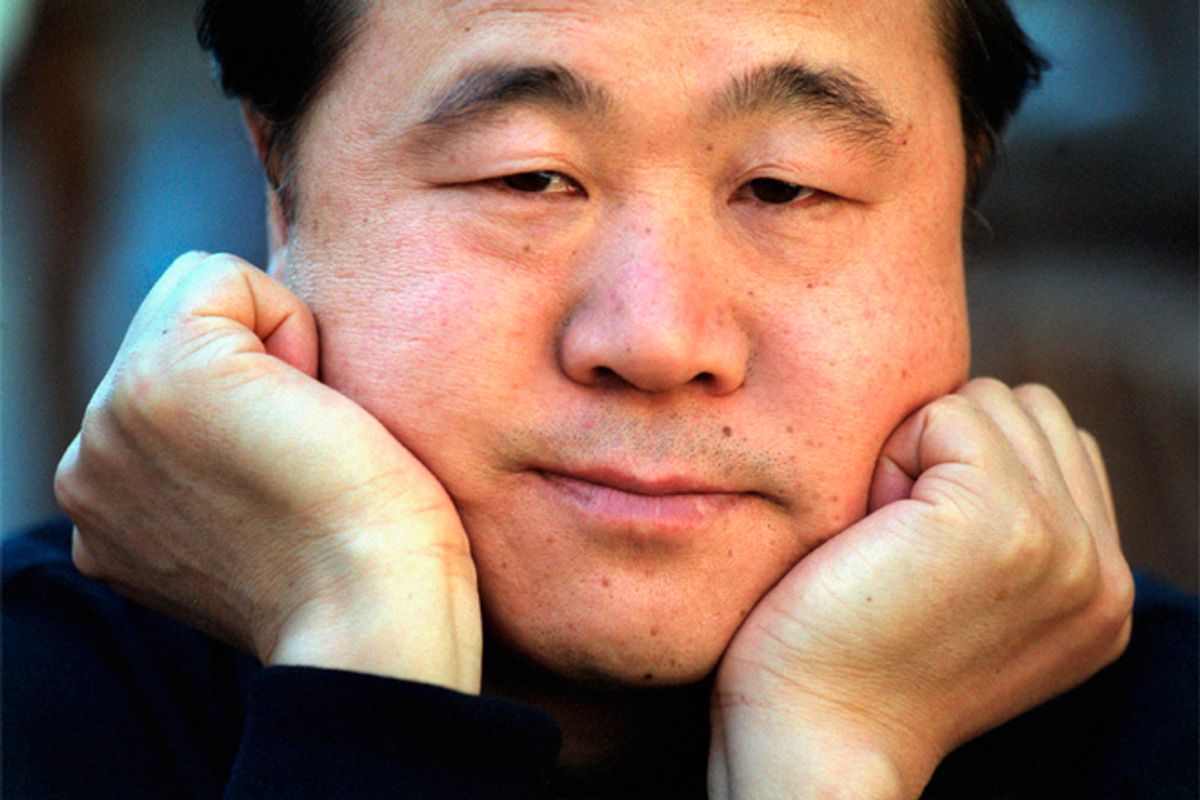Like a lot of people, I greeted today's news that Chinese writer Mo Yan has won the 2012 Nobel Prize in Literature with the familiar feeling that the Swedish Academy had me on the back foot. I have never read a word the man has written. I comforted myself with the thin reassurance that at least I'd heard of him — and I'd even seen "Red Sorghum," a film based on one of his best-known novels!
Unlike a substantial percentage of the back-foot club, however, I've got no problem with the Academy's choice, or its history of selecting purportedly "obscure" recipients for the prize. From the handful of articles and reviews I've read in my frantic scramble to get caught up, Mo Yan seems to write the kind of novels I enjoy (and I really did love "Red Sorghum"). "Hallucinatory realism"? "A world of magic, sexual exploitation, ignorance and senseless violence"? Individual stories told against a backdrop of political and social turmoil? Sign me up.
This, it seems to me, is what the Nobel Prize is uniquely suited to do: Call the attention of the wider world to the best living writers of cultures prone to neglect outside their own national borders. Yet each year's announcement is invariably preceded by much kibitzing about the famous writers who ought to win — Philip Roth is the chief perennial, but Bob Dylan has taken the lead recently -- and followed by tantrums when they don't. Blake Bailey, Roth's authorized biographer, tweeted: "Mo Yan my ass. #Rothscrewedagain"
The notion that Bob Dylan has ever even been considered for the Nobel Prize in literature seems to have originated at Ladbrokes, a British betting house that will accept wagers on whatever name takes your fancy, especially if you're virtually guaranteed to lose. As M.A. Orthofer, editor of the Complete Review, a website dedicated, among other things, to championing literature in translation, put it, "No one who has the remotest concept of the Nobel Prize would ever have suggested" that Dylan was a candidate, but "people like the idea of betting on him." Those bets in turn prompt newspaper stories about Dylan's rising odds and foster the impression that he's under consideration.
We're talking about two Nobel Prizes in literature here: the real-world one and the fantasy-league version. The fantasy one serves to validate the tastes of that class of reader who is overly fond of rankings and whatever form of comfort they derive from believing that the "greatest" artists in the world have been conclusively identified and honored. For these, the Nobel Prize is designed not to kindle curiosity but to confirm that their own complacent tastes have been objectively verified and approved. No need to rouse yourself from the Barcalounger, sir!
The real-world Nobel is up to something different, and if the Academy sometimes strikes a false note (Elfriede Jelinek seems to have been a particularly unfortunate choice), it also often succeeds in persuading readers to try writers they might otherwise never have heard of. Perhaps the most successful of all of these was Naguib Mafouz, whose 1988 Nobel win introduced many enthusiastic Westerners to his Balzackian novels set in modern-day Cairo.
It should be noted that Mo Yan is not an obscure writer. He is one of China's best-known novelists and the recipient of numerous prizes. His works have been translated into English and reviewed in major publications here. All of this suggests that his novels have an appeal that is evident to more than just the Swedish Academy and that references to anyone's posterior are unwarranted and premature. You can stay in your room and sulk about it, or you can try opening your door and looking outside for a change.
Further reading
The New York Times on Mo Yan and the 2012 Nobel Prize in Literature
James Willeford for Humanities magazine on Mo Yan 101
"Frogs," a short story by Mo Yan, published in the literary journal Granta
John Freeman of Granta interviews Mo Yan
Simon Elegant profiles Mo Yan for Time magazine
Jonathan Spence reviews Mo Yan's "Life and Death are Wearing Me Out" for the New York Times
Kevin Canfield for Salon on why Bob Dylan is not going to win the Nobel Prize



Shares